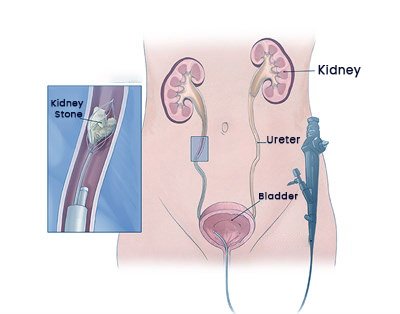About Us
URS Treatment for Kidney Stones
URS is a minimally invasive surgical procedure used to diagnose and treat kidney stones located in the ureter. A thin, flexible scope (ureteroscope) is inserted through the urethra and bladder, reaching the ureter to visualize the stone. Lasers or small instruments can then be used to break up or remove the stone.

How URS is Diagnosed
The decision for URS is often based on the findings from tests used to diagnose kidney stones, such as:
- Urinalysis and blood tests: These check for signs of infection or abnormalities.
Imaging scans (X-ray, CT scan, ultrasound): These pinpoint the location and size of the stones.
Advantages of End-to-End Surgical Care with URS
At Surgical Care Experts, we manage your entire URS experience:
- Pre-operative consultations: We discuss your condition, explain the URS procedure, and answer any questions you may have to alleviate anxiety.
- Surgical expertise: Our qualified urologists use advanced URS techniques and state-of-the-art equipment for a more comfortable and efficient procedure.
Post-operative care: We provide comprehensive follow-up appointments to monitor your progress, manage any pain, and minimize the risk of complications.
Symptoms of Kidney Stones Suitable for URS
- Stones located in the ureter that are causing pain, blockage, or bleeding.
- Stones that are too large to pass on their own.
Causes of Kidney Stones (addressed previously in Kidney Stones section)
We recommend reviewing the “Kidney Stones” section for a detailed explanation of factors contributing to kidney stone formation.
When to See a Doctor
Risk Factors for URS Complications
- Bleeding
- Infection
- Damage to surrounding organs
- Recurrence of kidney stones
Prevention of Kidney Stones (addressed previously in Kidney Stones section)
We recommend reviewing the “Kidney Stones” section for strategies to prevent future kidney stones, such as staying hydrated and potentially modifying your diet.
Patient Testimonials



FAQ's
URS offers a more targeted approach than ESWL (shockwave therapy). It allows for direct visualization and removal of the stone, especially those in the ureter that wouldn’t respond well to ESWL.
In many cases, URS can be performed on an outpatient basis. You might go home the same day or after a short observation period.
The URS procedure typically takes 30-60 minutes, depending on the complexity of the case and the stone’s location.
You might experience some burning sensation or discomfort while urinating for a few days after surgery. Pain medication can help manage this. Your doctor will provide specific instructions on post-operative care, including rest and increased fluid intake.
You will likely receive general or local anesthesia during URS to ensure comfort and minimize any movement that could affect the procedure’s precision.
URS boasts a high success rate, with a significant percentage of stones being successfully removed.


